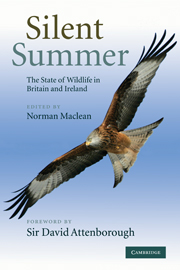Book contents
- Frontmatter
- Contents
- List of contributors
- Foreword
- Preface
- Acknowledgements
- List of abbreviations
- 1 Introduction
- PART I FACTORS DRIVING CHANGES IN WILDLIFE
- PART II CONSERVATION IN ACTION
- PART III THE CASE HISTORIES
- 15 Mammals in the twentieth century
- 16 Bats
- 17 State of bird populations in Britain and Ireland
- 18 The conservation of the Grey Partridge
- 19 Reptiles
- 20 Amphibians
- 21 Freshwater fishes: a declining resource
- 22 Riverflies
- 23 Bumblebees
- 24 Butterflies
- 25 Moths
- 26 Dragonflies (Odonata) in Britain and Ireland
- 27 Flies, beetles and bees, wasps and ants (Diptera, Coleoptera and aculeate Hymenoptera)
- 28 Hemiptera
- 29 Grasshoppers, crickets and allied insects
- 30 Aerial insect biomass: trends from long-term monitoring
- 31 Other invertebrates
- 32 Land and freshwater molluscs
- 33 The seashore
- 34 The offshore waters
- 35 Plants
- 36 Conclusion: what is the likely future for the wildlife in Britain and Ireland?
- Glossary
- Name index
- Subject index
- Plate section
- References
36 - Conclusion: what is the likely future for the wildlife in Britain and Ireland?
Published online by Cambridge University Press: 05 August 2012
- Frontmatter
- Contents
- List of contributors
- Foreword
- Preface
- Acknowledgements
- List of abbreviations
- 1 Introduction
- PART I FACTORS DRIVING CHANGES IN WILDLIFE
- PART II CONSERVATION IN ACTION
- PART III THE CASE HISTORIES
- 15 Mammals in the twentieth century
- 16 Bats
- 17 State of bird populations in Britain and Ireland
- 18 The conservation of the Grey Partridge
- 19 Reptiles
- 20 Amphibians
- 21 Freshwater fishes: a declining resource
- 22 Riverflies
- 23 Bumblebees
- 24 Butterflies
- 25 Moths
- 26 Dragonflies (Odonata) in Britain and Ireland
- 27 Flies, beetles and bees, wasps and ants (Diptera, Coleoptera and aculeate Hymenoptera)
- 28 Hemiptera
- 29 Grasshoppers, crickets and allied insects
- 30 Aerial insect biomass: trends from long-term monitoring
- 31 Other invertebrates
- 32 Land and freshwater molluscs
- 33 The seashore
- 34 The offshore waters
- 35 Plants
- 36 Conclusion: what is the likely future for the wildlife in Britain and Ireland?
- Glossary
- Name index
- Subject index
- Plate section
- References
Summary
The introductory chapter of this book spoke of wildlife in Britain and Ireland in the context of a possible Great Extinction. In terms of wildlife worldwide, I have no doubt whatsoever that this prognosis is accurate, but I am pleased to say that the prediction seems to me to be somewhat less applicable to the future of wildlife in Britain and Ireland. As I will emphasise in more detail later in this chapter, there have certainly been some very serious declines, especially of insects such as dragonflies, riverflies and Lepidoptera (butterflies and moths), but the prediction is presently much less applicable to vertebrates. Why should this be? Perhaps many vertebrates such as mammals and birds are, because of their behavioural sophistication, more able to ride storms of change in terms of food availability and habitat loss, or perhaps the widespread use of insecticides has simply hit insects selectively. Some bats, and some non-flying mammals such as Red Squirrel and Water Vole are in steep decline, and some birds such as Willow Tit and Corn Bunting are perhaps species with somewhat specialised niches which cannot readily adapt in the short term, but for most vertebrates, although there remains cause for anxiety and a need for rapid action, the immediate outlook is not catastrophic.
However, this optimistic prognosis for vertebrates could easily have a false basis in the longer term.
- Type
- Chapter
- Information
- Silent SummerThe State of Wildlife in Britain and Ireland, pp. 667 - 691Publisher: Cambridge University PressPrint publication year: 2010
References
- 2
- Cited by



